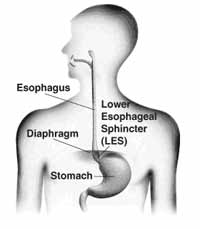Is it Simple Heartburn or Is it GERD?
Nearly everyone has heartburn now and then. But heartburn is also the most common symptom of gastroesophageal reflux disease (GERD), so talk to your doctor if:
- Your heartburn happens 2 or more times a week
- Your heartburn gets worse
- Your heartburn happens at night and wakes you from sleep
- You’ve had heartburn now and then, but for several years
- You have difficulty or pain when swallowing
- Your discomfort or pain interferes with your daily activities
Symptoms and Characteristics of GERD

Gastroesophageal reflux disease, or GERD, is a very common disorder. Gastroesophageal refers to the stomach and the esophagus. Reflux refers to the back-flow of acidic or non-acidic stomach contents into the esophagus. There is no known single cause of GERD. It occurs when the esophageal defenses are overwhelmed by stomach contents that reflux into the esophagus.
A band of muscles at the junction of the stomach and esophagus called the lower esophageal sphincter (LES) normally acts, in conjunction with the diaphragm, as a barrier to prevent reflux of stomach contents into the esophagus. If that barrier is relaxed at inappropriate times or is otherwise compromised, reflux occurs.
GERD is characterized by symptoms and/or tissue damage that results from repeated or prolonged exposure of the lining of the esophagus to contents from the stomach. If tissue damage is present, the individual is said to have esophagitis or erosive GERD. The presence of symptoms with no evident tissue damage is referred to as non-erosive GERD.
GERD symptoms are often persistent, such as chronic heartburn and regurgitation of acid. But sometimes there are no apparent symptoms, and the presence of GERD is revealed when complications become evident.
Symptoms of GERD vary from person to person. The majority of people with GERD have mild symptoms, with no visible evidence of tissue damage and little risk of developing complications.
Periodic heartburn is a symptom that many people experience. If it occurs occasionally just after a meal and less than once per week, it is likely a “benign” condition.
Heartburn that occurs more frequently than once a week, becomes more severe, or occurs at night and wakes a person from sleep, may be a sign of a more serious condition and consultation with a physician is advised. Even occasional heartburn – if it has occurred for a period of 5 years or more, or is associated with difficulty in swallowing– may signal a more serious condition. People with long standing chronic heartburn are at greater risk for complications including stricture or a potentially pre-cancerous disease that involves a cellular change in the esophagus called Barrett’s esophagus.
Did you know – heartburn is not the only symptom of GERD
Chronic heartburn is the most common symptom of GERD. Acid regurgitation (refluxed material into the mouth) is another common symptom. But numerous less common symptoms other than heartburn may be associated with GERD. These may include:
- Belching
- Difficulty or pain when swallowing
- Waterbrash (sudden excess of saliva)
- Dysphagia (the sensation of food sticking in the esophagus)
- Chronic sore throat
- Laryngitis
- Inflammation of the gums
- Erosion of the enamel of the teeth
- Chronic irritation in the throat
- Hoarseness in the morning
- A sour taste
- Bad breath
Chest pain may indicate acid reflux. Nevertheless, this kind of pain or discomfort should prompt urgent medical evaluation. Possible heart conditions must always be excluded first.
Relief of symptoms after a two-week trial therapy with a proton pump inhibitor (a prescription medication that inhibits gastric acid secretion) is an indication that GERD is the cause. This can also be confirmed with pH monitoring, which measures the level of acid refluxing into the esophagus and as high as the larynx.
Barrett’s Esophagus
In a small subset of patients with GERD, a complication has been identified as a potentially pre-cancerous condition. The condition is called Barrett’s esophagus. It is a condition in which normal tissue lining of the esophagus has been replaced by abnormal tissue lining called specialized intestinal metaplasia.
Barrett’s esophagus is a risk factor associated with a type of cancer in the esophagus called esophageal adenocarcinoma. In a small number of people with Barrett’s esophagus cellular changes occur in the Barrett’s tissue that are considered pre-cancerous, or more likely to develop cancer than normal tissue.
The number of people who develop Barrett’s esophagus is relatively small. If Barrett’s esophagus is present, talk to your doctor about regular endoscopic screening. In the absence of Barrett’s esophagus, there is no strong evidence that GERD is a risk factor for developing cancer.
Adapted from IFFGD Publication: GERD Questions and Answers. Revised 2010 by Ronnie Fass, MD, Chair, Division of GI and Hepatology, Metro Health Medical Center, Cleveland, OH. Original Contributors: Joel E. Richter, MD, Philip O. Katz, MD, and J. Patrick Waring, M.D. Editor: William F. Norton, International Foundation for Functional Gastrointestinal Disorders, Milwaukee, WI.
